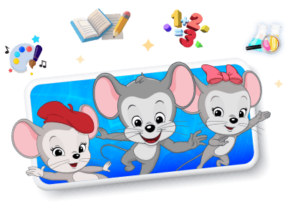
What is worldschooling?
Get insights on this popular approach to learning and how to incorporate it into your homeschool.
Worldschooling is an educational movement or mindset that believes interacting with the world around you is the best way to educate a child. This often involves traveling across the globe to discover and learn from different cultures.
While worldschooling centers on the idea that the world is the best classroom, this learning style has many different approaches and variations. Some worldschooling families combine traveling and traditional school systems by enrolling their children in schools in different countries.

Other families use a homeschooling curriculum and structure for their children while traveling across the world. And still others adopt an unschooling approach to learning, where they trust their child’s instinct to guide them in their education while learning about the world around them.
There’s no one correct path to worldschooling, and it’s an ideal learning environment for some families. For many, what started as a “gap year” (taking a year off of school and work to travel) has evolved into worldschooling and become a way of life.
What are some advantages of worldschooling?
Worldschooled children often have a better understanding of their place in the world and their connection to different cultures due to their world travels. In this unique educational setting, children have an opportunity to learn while exploring, which can lead to more retention and overall learning.
Worldschooling often fosters an appreciation for different traditions, cuisines, and languages. Unlimited time together leads to bonding and growing together as a family. Connecting to the worldschooling community allows families to meet other families with a variety of backgrounds and beliefs.
What are some disadvantages of worldschooling?
Worldschoolers will incur travel costs and often experience a change in income for families, which can cause financial strain. Some parents try switching to remote work that they can do while traveling to help offset costs.
Adopting a new learning structure can also cause stress for families. Selecting and familiarizing yourself with a good on- and offline curriculum before leaving can ease this transition. Worldschooling families may also miss connecting with family and friends, the comforts of home, and scheduled weekly activities such as sports, music programs, or other hobbies.
How can I afford worldschooling?
While seeing the world requires money, worldschooling families find ways to save and make it happen. Families dedicated to travel might rent or sell their home and personal belongings to fund their trip and avoid splurging on unnecessary experiences and products. Simple, inexpensive experiences are often a wonderful way to learn.
Tips for Saving Money While Worldschooling
- Plan your worldschooling adventures in more affordable destinations.
- Purchase groceries and goods from local markets.
- Compare rates at hostels, home and apartment rentals, and hotels. Some rentals reduce the rate if you stay longer.
- Make your own meals at home instead of eating out.
- Use public transportation.
- Try not to treat the entire trip like a vacation. Plan and stick to a budget to help make your funds last.
- Research attractions. Activities in smaller towns can sometimes be more economical than the tourist attractions in large cities.
Are there laws for worldschooling?
Worldschoolers are subject to the homeschooling regulations in their home state, even while abroad. However, if you stay in a foreign country long enough, you may also be subject to their laws and regulations. Consult a legal professional for homeschool laws while abroad.
Support Your Homeschool with ABCmouse and Adventure Academy
Our digital learning programs are designed by curriculum experts to assist your homeschool and children ages 2 through 13. ABCmouse is a comprehensive online educational platform for children ages 2-8, while Adventure Academy focuses on children ages 8-13. Both programs provide access to lessons on reading, language arts, math, sciences, social studies, and more. Learn more about how each program can enhance your homeschool below.
ABCmouse and Homeschooling
ABCmouse offers over 10,000 learning activities and more than 850 lessons for children, plus a large digital library of books and educational puzzles, songs, activities, and worksheets. The program encourages self-paced learning with motivating rewards and includes progress tracking, which allows home educators to monitor time spent on certain subjects and the number of activities completed.

Then just $14.99/mo. until canceled
As a paid add-on to regular subscriptions, home educators can access the Assessment Center, which allows parents and caregivers to test children on their knowledge, determine successes and struggles, and receive recommended lessons based on assessments.
ABCmouse provides a robust curriculum that can supplement other early learning lessons. It’s trusted resource that’s been downloaded over 10 million times and has a 4.5-star average out of 831.4K ratings.
Adventure Academy and Homeschooling
Adventure Academy combines an interactive world with a curriculum covering reading, language arts, math, science, and social studies. With quests, games, and educational videos and activities, learning becomes an epic journey that motivates kids to explore various topics.
For homeschooling families, Adventure Academy offers an engaging, flexible learning experience that can supplement other educational materials. The program features thousands of activities created by curriculum experts and covers all major academic domains.
Parents and caregivers can choose academic difficulty levels and track each child’s progress, seeing time spent in Adventure Academy, activities completed, and subjects studied.
Adventure Academy emphasizes key topics such as reading comprehension, vocabulary development, mathematical operations, fractions, world geography, American history, physical science, life science, earth science, and scientific inquiry.
For more information, visit AdventureAcademy.com.
More from ABCmouse:
-
Rhyming Schemes for Kids with Examples
Learn what a rhyme scheme is, see examples from poems and nursery rhymes, and discover fun activities to help kids recognize and practice rhyming patterns.
-
Why Rhyming is Important? (Tips for Teaching)
Discover why rhyming is key for early literacy and how it helps kids develop phonemic awareness. Get expert insights and fun activities to teach rhyming.
-
Rhyming Couplets – With Definitions and Examples
Discover rhyming couplets with fun examples, poetry styles, and engaging activities for kids. Explore famous poems and creative ways to learn rhyme!
-
Easy Ways to Teach Blending Words
Teach young readers to blend words with these fun strategies and activities! Discover phonics blending techniques, examples, and hands-on learning tips.
-
Best Rhyming Books for Young Readers
Discover 50 engaging rhyming books for toddlers to second graders! Boost early literacy skills, enjoy playful language, and make reading even more fun.
-
How to Teach One to One Correspondence Made Easy
Discover play-based activities and tips to teach one-to-one correspondence, a key math concept, to preschoolers in fun and engaging ways.







